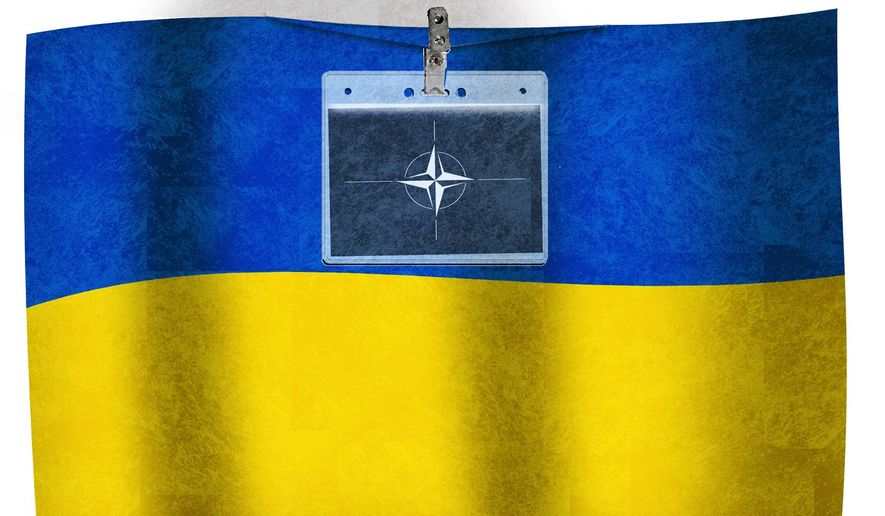OPINION:
Ukraine wants to join NATO. Its president, Volodymyr Zelensky, said NATO would provide a “powerful deterrent to Russia” and that NATO enacting a Membership Action Plan with NATO would “send a real signal” to the Russians that help, for Ukraine, is on the way.
But it is unlikely to happen because the forces arrayed against it are just too great.
The Russians don’t want NATO on their doorstep obviously. The rest of NATO is indifferent, especially considering aligning with Ukraine could put it into a hot war with Russia within weeks.
The Biden administration is at best indifferent and perhaps even hostile to the notion. Not only did it make Ukraine’s president one of the very last world leaders to finally talk to President Biden in person, it has said the decision on Ukraine membership is up to NATO, which is the equivalent of putting it off indefinitely.
Then last month, it sanctioned Igor Kolomoisky, one of Ukraine’s most powerful oligarchs, for his alleged theft of billions of dollars from a Ukrainian bank he owned and for allegedly laundering some of that money into the United States.
Given the incidents took place in 2014 and 2015 and were well known to the Obama administration before it left office, it seems the timing is geared to hurt Mr. Zelensky by making it look as if Mr. Zelensky consorts with crooks. The president, an entertainer, once appeared in a show on a network owned by Mr. Kolomoisky and recently allowed him to return from exile.
There are a few plans being floated for getting Ukraine into NATO — one of which involves going in along with Georgia. But what all those plans depend on is whether Mr. Zelensky can convince NATO his country — and particularly his administration — is not unduly corrupt.
Fortunately, it so happens there is something approaching a perfect test case out there. Canadian TIU Canada, which builds solar farms, has sued Nikipol Ferroally Plant, which Mr. Kolomoisky owns, claiming Kolomoisky forced the shutdown of the solar farm to benefit his energy interests.
In January 2018, TIU Canada opened a solar power plant on land leased long term from the city of Nikopol. Its power connects to a substation that happens to be on the grounds of the Nikipol Ferroally Plant, which produces ferroalloys, fluxes, manganese sinter, granulated slag and crushed stone for export to more than 50 nations.
In late December 2019, the Nikopol Ferroalloy Plant informed Canadian TIU it would disconnect it from the substation for repairs after Feb. 29, 2020. The Canadians tried to work out something to keep the plant operating, but on Mar. 1, 2020, right on schedule, the plant was disconnected.
The disconnection, which Canadian TIU says is illegal because the law calls for all parties to have to approve any such move, has caused 1.5 million euros worth of economic damage.
Mr. Zelensky has lauded the Canadian TIU facility, saying in July 2019 that green energy “will be one of the key sectors of our economy during the upcoming years” and that TIU “already works successfully in this area. We are grateful to them for this.”
But the Kyiv Commercial Court rejected the claims of Canadian TIU, and the firm has appealed the decision to a higher court. A lot more than 10.5 megawatts of solar power, which can power perhaps 10,000 homes, hangs in the balance.
“The present court case is a real rest of whether or not a major international investor can obtain a fair trial within the current judicial system in Ukraine,” said Morgan Williams, president of the U.S.-Ukraine Business Council.
It’s also a test of what kind of country Ukraine wants to be. It attracted just $3.1 billion in foreign direct investment last year because investors don’t believe they can obtain a fair trial within the current judicial system in Ukraine. It is the least economically free of the 45 countries in Europe. Its people earn just $13,000 a year and nearly 9% are unemployed.
The people of Ukraine know corruption drags down their country, and they want to do better. They want to engage with the European Union and NATO. If Mr. Zelensky wants to fix his country, firing more ministers is unlikely to help. But ensuring Canadian TIU is treated fairly here, even if that means stepping on Mr. Kolomoisky’s toes, would. It might even get Mr. Zelensky that all-important pathway to membership his administration now so desperately needs.
• Brian McNicoll, a freelance writer based in Alexandria, Va., is a former senior writer for The Heritage Foundation and former director of communications for the House Committee on Oversight and Government Reform.




Please read our comment policy before commenting.